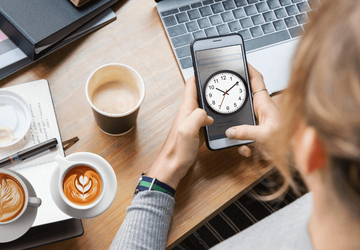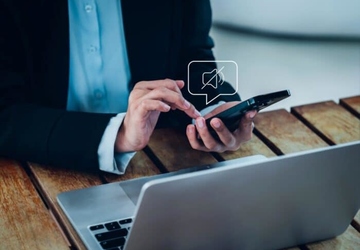Determining the best time to switch off social media can be complex. Many symptoms emphasize the need for a break. Some common signs include:
- Overload or anxiety after reading social media.
- Decreased productivity in work or scientific activities.
- Feelings of inadequacy or decreased self-esteem.
- Excessive time online, which affects actual interactions.
When these symptoms become prominent, it is often the best time to temporarily switch off social media to maintain mental balance.
The Best Time to Switch Off

Deciding when to switch off from social media varies from person to person. Here are some typical moments to consider:
- During the holidays: This period provides a natural opportunity to relax and enjoy meaningful time with your loved ones.
- Before bed: Reducing screen time an hour before bedtime can reduce sleep quality.
- During work or school: It is easier to maintain focus and performance.
- After a major event: Allow time to process emotions without external stimulation.
Recognizing when to disconnect from social media can significantly improve mental health and well-being.
Benefits of a Social Media Detox
There are countless benefits to a social media detox, including:
- Improved mental health: Relieves anxiety, depression, and stress.
- Better sleep: Reduced exposure to blue light can improve sleeping patterns.
- Increased productivity: More focused on tasks and activities without constant interruptions.
- Strengthened relationships: More meaningful interactions with friends and family.
Recognizing the benefits of a social media detox can motivate individuals to take the necessary actions to achieve a healthy digital life.
Strategies for Effective Breaks
Implementing effective breaks requires careful planning. Here are some strategies to consider:
- Set clear goals: Describe what you want to achieve during your break, such as B. sleeping better or reducing stress.
- Inform your colleagues: Inform friends and family about your break to lower their expectations.
- Explore alternatives: Engage in activities that avoid screen time, such as B. reading, exercising, or pursuing a hobby.
- Use technology wisely: Use apps that limit social media use or set reminders for breaks.
These strategies will help you determine the best time to avoid social media and ensure a successful detox.
Recognize the Need for Regular Breaks
Regular breaks are essential for long-term health. Here are some reasons why:
- Prevent burnout: Regular breaks prevent you from feeling overwhelmed by the constant flow of information.
- Promote mindfulness: Taking time out promotes being present and appreciating the present moment.
- Encourage creativity: Stepping away from screens can spark new ideas and perspectives.
Knowing when to regularly disconnect from social media can provide lasting mental and emotional health benefits.
Practical Tips for Maintaining Balance
Maintaining a harmonious balance between your online and offline lives is essential. Here are some practical tips:
- Create a schedule: Set specific times for social media use and stick to them.
- Limit notifications: Turn off unnecessary notifications to avoid distractions.
- Follow positive accounts: Surround yourself with motivational and uplifting content.
- Reflect regularly: Evaluate how social media affects your mood and adjust your usage accordingly.
These tips can help identify the best time to take a social media break and promote a balanced lifestyle.
Personal Experiences and Insights
Opinions from others who have taken successful breaks can provide valuable insights:
- Case study 1: Jane realized that finals week was the best time to take a social media break. She noticed an improvement in focus and better grades.
- Case study 2: Mark decided to avoid social media after a hard day at work. His anxiety decreased, and his sleep quality improved.
- Case Study 3: Sarah discovered the benefits of a social media detox while on vacation. She felt more relaxed and more connected to her family.
These personal stories highlight the positive impact of taking a break and can inspire others to do the same.
Conclusion
Taking a break from social media has many benefits, from improved mental health to increased productivity. Recognizing the best times to take a break from social media, deciding when to disconnect from social media, and appreciating the benefits of a social media detox can lead to a healthier, more balanced life. By implementing practical strategies and learning from the experiences of others, individuals can make informed decisions about their social media use and enjoy the benefits of a digital detox.
Naturally! This is a revised version with more sophisticated and unique vocabulary while retaining the original keywords:
Advanced Strategies for a Successful Detox

A successful social media detox requires a sophisticated approach and strategy. Here are some of the breakthrough approaches:
- Deliberate Engagement: Rather than total abstinence, intentional engagement is achieved by setting aside specific, limited time for daily social media use.
- Digital Vacations: Regularly planned longer breaks, such as weekends or weeks, where you avoid social media use to restore mental balance.
- Offline activities: Explore hobbies and interests away from digital devices, such as outdoor adventures, artistic activities, or social events.
- Journaling: Keep a journal to record your emotions and experiences during detox to facilitate self-reflection on the benefits and challenges of detox.
Understanding the Psychological Impacts
Understanding the profound psychological impacts of social media use and detox can help us gain insight into our behaviours and habits:
- Behavioral addiction: Social media consumption can lead to behavioural addictions, characterized by compulsive checking and feelings of withdrawal when away.
- Psychological withdrawal: Taking a break may cause feelings of anxiety or FOMO (fear of missing out) at first, which will gradually lessen as detox progresses.
- Cognitive benefits: Research shows that reducing social media use can improve cognitive skills, such as attention span and critical thinking.
The Role of Peer Influence
Peer influence plays a crucial role in both social media use and detoxification:
- Social pressure: Peer influence influences the time spent on social media platforms and detoxification decisions.
- Support networks: Cultivating supportive offline relationships can provide encouragement and accountability during the detoxification phase.
- Group detoxification activities: Participating in group challenges or detoxification activities can strengthen resolve and enrich the overall experience.
Global Perspectives on Digital Well-Being
Examining global perspectives reveals cultural differences in social media use and detoxification approaches:
- Cultural norms: Different cultures have different norms and attitudes towards social media, influencing individuals' detoxification decisions.
- Government initiatives: Some countries have implemented policies to promote digital well-being and conscientious use of social media.
- Cross-cultural research: Studying cross-cultural attitudes towards digital detoxification can provide valuable insights into practical strategies for different populations.
